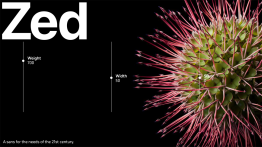designing Type for Accessibility
Monday, July 1, 2024, 12:30 - 2:30pm

Typotheque worked on a largest project up to date, developing a series of fonts to be easy to read by the widest range of readers. The project identifies and addresses situations where people are excluded from using certain technologies, and worked with digitally disadvantaged communities to support marginalised languages. For the Latin script Typotheque team carried out a series of laboratory acuity tests at the National Centre of Ophthalmology in France to determine the ideal letter proportions for their visually impaired patients, and developed fonts that benefit readers with declining vision. Zed Text is an exceptionally readable typeface that has been shown to benefit healthy readers as well as those with visual impairments such as age-related macular degeneration, loss of central vision, peripheral vision loss and blurred vision.
Registration required.
Peter Biľak works in the field of editorial, graphic, and type design. Since 1999 he is running Typotheque type foundry.
With a background in cognitive psychology and neuroscience, Héctor Mangas Afonso produces research for Typotheque, focusing on perception of type, from accessibility to acceptance.
Benjamin Ribeau is a partner at Integral Designers in Paris.
Located in the Frederick P. Rose Auditorium, at 41 Cooper Square (on Third Avenue between 6th and 7th Streets)




